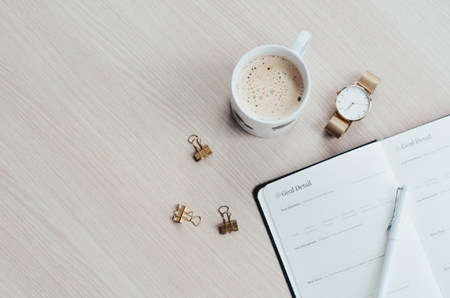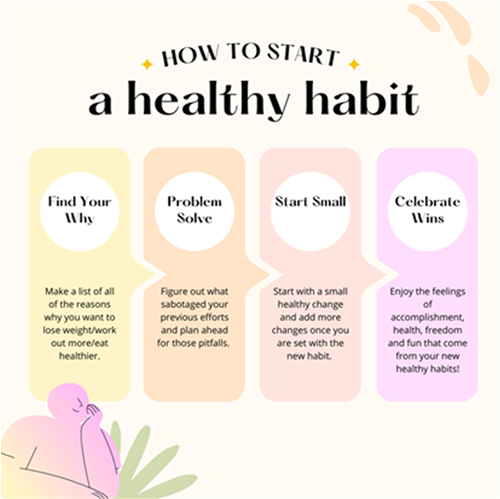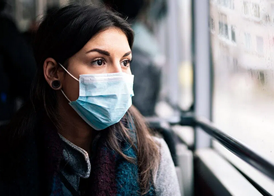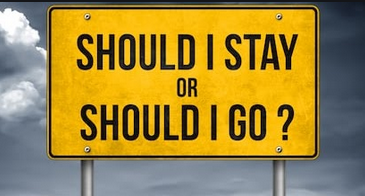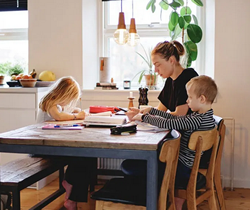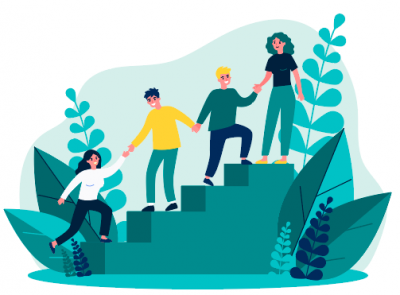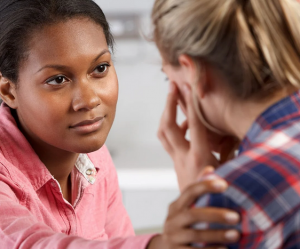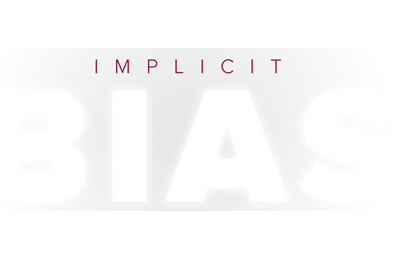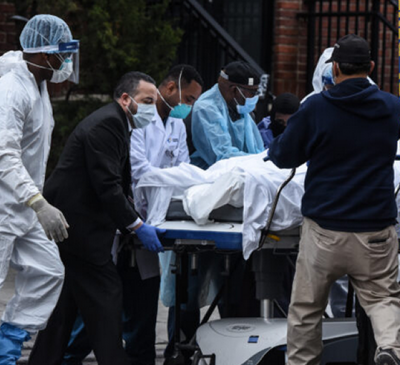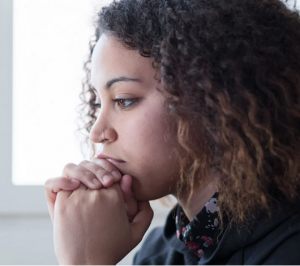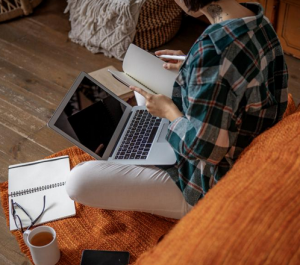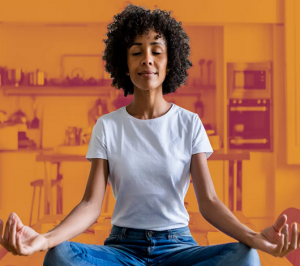Meaning Matters
April 2022 / by Randy Kolin, Psy.D., LLNL EAP Psychologist
And away we go!! Let’s do what we can for ourselves to be successful. A key ingredient to one’s success is to make it personal. By this I mean in order to have a greater chance of success we need to buy in.
According to Dr. Amy Bucher, "The closer you can get to a personalized approach, the better. Successful long-term changes happen when a person buys into them—whether it's because they cared enough about a goal to cultivate a series of habits, or because they've decided they’re willing to put in hard work for the duration. The more we can tie what we are asking people to do to reasons that matter to them, their goals and values and self-perceptions, the more we make it worth their while to try. There's a lot we can do to make a personalized approach scalable and realistic."
Today, there are a greater number of tools and technology available to provide optimism and hope for positive change. The goal is to address one or more behaviors we would like to change and why. Simply saying, “I want to lose weight” is not enough. We can personalize goals by stating what we want and what benefit we desire from the changed behavior. We need to rid ourselves of judgment and distraction. Shaming ourselves because we did not achieve a goal is not a moral failure or a sign of weakness. There can be many reasons why things did not work out, but these reasons can be overcome and resolved.
By understanding why we lose focus and get away from the goals we set will make it easier to get back to it. Part of the problem of maintaining healthy habits is they are not enjoyable. When we enjoy something, we are more likely to do it longer and better. There is research to support a direct correlation between enjoyment and creating a habit. If waking up early is the bane of your existence, setting a goal to exercise before work is doomed to fail. If sweets are a downfall, eliminating them will be your demise. If we do not like what we are doing, we will not do it for long. Focus on making new behaviors enjoyable. If we engage in a new behavior and enjoy it, it will be easier to change and make it a habit.
Behavior Matrix:
Now, how do we make behaviors enjoyable? There is a principle called “Minimal Enjoyable Action” or MEA’s. When you start a new habit, stick to the absolute simplest action possible. The idea is to start with a simple action and slowly add to create behavior change. This is where thoughts matter. We need to set ourselves up for success and avoid self-imposed, limiting expectations. Avoid the all or nothing approach, be open, and focus on the simplest possible action. If eating healthy is a goal, start by eating one healthy thing each day (MEA), every day for one week. Do this until you feel ready to work up to adding another healthy food choice. Do not force yourself into something you will not enjoy. Give yourself time to adjust and enjoy the new change to become a habit. The object is to become a consistent practitioner of a healthful habit.
In the process of regularly doing our MEA, we not only build skill, but we strengthen our willpower. Rewarding the brain with small “success experiences” builds willpower over time. Once the MEA turns into a habit, it allows for expansion into slightly more advanced behaviors, such as with exercise, walking for a few minutes more or increasing the pace. Through consistent practice of the MEA, both skill and willpower are increased until doing what once seemed difficult, becomes easy. Soon, we are eating healthier foods or running more miles per day and accomplishing the goal of living a more healthful life.
So, to put into practice:
1. Identify your why. Make a list of all the reasons why you want to lose weight/work out more/eat healthier. For example, I want to lose weight so I can play with my grandkids.
2. Figure out previous failures and problem solve. For example, maybe a previous weight loss attempt was tanked when you binged on chips and ice cream every night. This time, you can remove the tempting foods from your kitchen.
3. Start with a Minimally Enjoyable Activity (MEA). Maybe running a marathon sounds like torture, but doing a dance video three times a week on YouTube would be a blast.
Make it fun and enjoy the challenge!!
LLNL Resources
- Are you signed up with WorkingWell’s online health platform, WebMD One? Check out this page to learn more.
- Visit the LLESA website for information about physical fitness:
- For more information on health challenges or other questions about assistance with healthy lifestyle changes, send an email to workingwell [at] llnl.gov (workingwell[at]llnl[dot]gov)
- The EAP offers a full range of services to help with personal problems
- For appointments, schedule through the EAP line: 925-423-6609
- Visit the Health Services Department website for an overview of all the services provided: https://health.llnl.gov/
Ready or Not?
May 2021 / by Roopal Lalaji, Psy.D., LLNL EAP Psychologist
Vaccines have become more easily accessible in the United States in recent weeks, and California is set to officially “reopen” on June 15th. While many countries continue to struggle with rising case numbers and vaccine accessibility, the US seems to be entering a new phase. Thus, it may be physically safer and increasingly possible to engage with the people and places we have been distanced from for so long. The moment many of us have been waiting for has arrived. But how do you feel about it emotionally? Are you ready?
The American Psychological Association (APA) recently released the results of their annual Stress in America survey. The link to the study is below. There were numerous findings of interest, however one in particular stood out to me. According to the APA's report, nearly 50% of Americans report anxiety about resuming in-person interactions once it is deemed safer to do so. The rates of endorsed anxiety were similar for those who were unvaccinated as those who were vaccinated. The APA has termed this type of anxiety “re-entry anxiety”. Re-entry anxiety is basically the stress and worry individuals may feel as they think about getting back to a more participatory life. The worry can invade many life domains such as concern about returning to the physical workplace, commuting, greater pressure to socialize in person with friends and family, worry about a decrease in social skills over the last year, risk of exposure to the Coronavirus and variants as one re-engages, and yet again having to adapt logistically and psychologically to a different routine. Personally, my re-entry anxiety centers around conflicted feelings about my opportunity for greater normalcy while many countries, including my beloved India, continue to suffer greatly.
Psychologists recommend vaccinated individuals take small steps to gradually reintroduce increased societal activity, as sustained avoidance can further compound fear and anxiety. Some tips for re-entry are below.
Assess and Activate
Take a look at what you have and haven’t done in the last year. What have you missed and look forward or need to do again, even if with some apprehension? For example, if your outings outside of the home have been limited, perhaps you can plan to meet a vaccinated friend for a walk, enjoy an outdoor meal at a restaurant after researching their safety protocols, or organize a small gathering of vaccinated individuals. If you have avoided the doctor for concern of exposure, now may be a good time to schedule missed health visits. If you have not gone to the grocery store and relied on delivery, you could venture out for a limited period at a time of day that feels more comfortable for you. Small steps with intention and a sense of control are key to easing anxiety.
Honor your Feelings
Those around you may be looking forward to travel, parties, live concerts, sporting events, rallies, and much more. That is ok. Identify and engage with your thoughts, feelings, fears, and excitement about re-entry. Allow yourself to emotionally sit with where you are without self-judgement, and find ways to gradually re-engage at your own pace and comfort level.
Understanding and Acceptance of Change
The past year has changed the whole world, the personal world that surrounds you, and you as an individual have been impacted as well. Your priorities, values, interests, and perspective may have evolved. You may re-enter a changed world as a changed person. This transition can be challenging. Seek support from trusted others including mental health professionals in your re-entry anxiety feels difficult to manage. Please know that who you are today has already been through so much in this past year, and you will be able to meet this moment, small step by small step.
https://www.apa.org/news/press/releases/stress#
https://www.advisory.com/en/daily-briefing/2021/03/30/reentry-anxiety
https://www.healthline.com/health-news/after-a-year-of-isolation-social-interaction-may-cause-anxiety#Why-you-may-feel-anxious-about-returning-to-normal
The Psychology Behind our Pandemic Eating Behaviors
January 14, 2021 / by Roopal Lalaji, Psy.D., LLNL EAP Psychologist
The Coronavirus pandemic and resultant stay at home orders have affected our lifestyles and eating behaviors in a variety of ways. At the beginning of the pandemic, in an effort to occupy time, find comfort, and to provide a sense of safety and food security during a period of uncertainty, many of us turned to bread making, baking, elaborate meal creating, and hoarding during infrequent grocery store trips.
The increased time spent at home can lead to overconsumption. We are surrounded by food triggers as we are working and staying in our homes more, within close proximity of our kitchens, leading to ease of access. It can be helpful to work in a space that is furthest from the kitchen. Also, try to set a structure around eating: only eating at meal times, logging intake to help with accountability, limiting the availability of foods that are overstimulating, and doing a check-in to assess physical hunger level or see if you are thirsty, before choosing to eat during a non-meal time.
The pandemic has also led to increased social isolation, limitations in our ability to engage in the activities we previously enjoyed, and greater feelings of stress, anxiety, sadness, and nostalgia for prior times. Food may serve as a source of comfort, coping, and means to keep those we are physically distanced from emotionally close via familiar foods and associated memories. While food is not necessarily an ineffective means of self-soothing, the relief we feel is likely temporary. If the reliance on food for psychological regulation continues to increase, we may have greater distress due to weight gain, health concerns, or feeling out of control about our eating behaviors.
It can be useful to brainstorm alternatives to manage emotions; calling or video chatting a friend to share concerns and gain support, practicing stress management techniques such as deep breathing or guided imagery, engaging in exercise to lift mood and the immune system, and identifying other distractions (e.g. reading a book, watching a show or movie, journaling, or doing a craft or hobby) that could help. Self-talk can also be extremely useful. I always ask my clients to be “reflective before they are reflexive” or “put a pause between the impulse and the action”. These phrases can be helpful reminders to assess if emotions are motivating your desire to eat, how you will feel during, and how you may feel afterwards. If you realize that food consumption may leave you feeling worse off, it can provide an opportunity to make a non-food related choice such as the activities mentioned above.
The pandemic has also impacted our rituals around eating. Nuclear families may have returned to cooking and eating together as schedules may be less hectic. This can be an opportunity to collaborate on healthy grocery shopping, recipe ideas, meal planning, and meal preparing. In addition to the food shared, it can be helpful to focus on what may have been gained, such as increased family time, during a period when much feels lost.
Many have also increasingly relied on take-out to provide greater variety of cuisine, to take a break from cooking, and to support local businesses. Take-out doesn’t have to be a trigger for overeating. Study the menu beforehand to find a choice you like that also meets your healthy eating goals. Look for modifications that can make the dish healthier, practice portion control by refrigerating half for tomorrow, or sharing a dish with a family member.
The pandemic has impacted our eating behaviors in a multitude of ways. Food is a source of nourishment, nurturance, pleasure, and connection. The new year is an opportunity to examine our eating behaviors. We can modify choices we no longer find effective, whether due to physical and/or emotional impact, and retain those that continue to resonate. Do all of this while treating yourself with grace, recognizing that this has been a year like no other. We all deserve extra kindness and compassion as we work towards a healthier body and mind.
If you would like support with weight management, please consider the Lighten Up Challenge offered by LLNL Health Services Working Well. The program offers support regarding diet, exercise, psychology, goal setting, and opportunities for additional engagement. A link to the program is below.
Homesick
November 14, 2020 / by Roopal Lalaji, Psy.D., LLNL EAP Psychologist
It is that time of year. Many of us are "homesick" for the people, places, and rituals that typically mark the holiday season. Below are two quick reads that I found helpful in aiding myself and my children as we continue to cope with a year unlike any other.
- https://greatergood.berkeley.edu/article/item/how_to_accept_that_holiday_gatherings_are_canceled
- https://www.ahaparenting.com/parenting-tools/traditions/december-traditions?utm_source=Dr.+Laura%27s+Parenting+Tips&utm_campaign=168ec6c8bb-EMAIL_CAMPAIGN_2017_12_10_COPY_01&utm_medium=email&utm_term=0_45e38f2e1a-168ec6c8bb-209865213
As 2020 soon comes to a close, I wish you self-compassion and self-care, support from loved ones near and far, strength in the face of adversity, and a strong hope that a brighter year is ahead.
Should I Stay or Should I Go?
November 17, 2020 / by Roopal Lalaji, Psy.D., LLNL EAP Psychologist
This holiday season will be unlike any other for my family and many others around the nation. Last weekend, we celebrated Diwali, the Indian Festival of Lights that marks the triumph of good over evil, and light over darkness. It was a markedly different holiday than years past. There was no large annual party with many children running around in their fancy clothes, no planning or rehearsal of a play the young ones enact to tell the story behind Diwali, no sparklers being lit, and no crowds of adults joyously catching up and sharing their wishes for the New Year.
Instead, we attended a Zoom pooja (prayer ceremony) my parents performed in their home. We dropped off sweets to close friends doorsteps vs stepping in, and they did the same for us. We had a lovely dinner with the family we are in a pod with. We savored delicious traditional food, the kids did Diwali crafts, we watched a recording of last years play, lit diyas (tea lights), and the adults soberly discussed our hope for light to come after this period of darkness. While the holiday was greatly modified from years past, the meaning of the day shone brighter than ever. We were more grateful for each other and the loved ones we miss seeing so much, we remembered the celebrations of years past with longing, while realizing that we will come out of this difficult period with patience and perseverance. The light will come.
As Thanksgiving and the December holidays fast approach, you may be grappling with how to mark these occasions. Many parts of the country have reverted to more restrictive safety measures to combat the spread of Covid-19. The rational awareness of what should be done to physically protect ourselves and those important to us may be in conflict with our emotions, our mental health needs, the desire to see those we love and haven't seen for months or years, and the traditional way of gathering we associate with these special days. Below are some considerations as you determine your holiday plans.
- Assess the level of risk you are comfortable with. Do you plan to celebrate with those in your household? Do you belong to a pod? Do you plan to gather with extended friends and family? If you plan to meet with those residing outside of you home, there are many follow up questions you could ask yourself. While not psychological in nature, I think the following questions can help with sound decision making, reduce anticipation anxiety, and help you feel a greater sense of control, whatever choice you make.
- How prevalent is the virus in my community?
- How prevalent is the virus in the communities where my potential companions reside?
- Do I or others I may meet with have any health conditions that put us at greater risk?
- What type of travel is required and how much risk is associated with that form of travel?
- Where will I or my potential guests stay?
- Am I aware of and comfortable with the safety precautions or risks my potential companions have been taking during the pandemic?
- Do we plan to gather indoors or outdoors?
- How will we arrange seating?
- How will food be prepared and served?
- What will the masking "policy" be and likely compliance with jointly established guidelines?
- Will a quarantine period or testing be required before we meet and if so what is the time frame?
- Do my potential companions and I share a similar overarching philosophy regarding safety and tolerable risk during the pandemic?
- How will you feel during and after the gathering? I come back to this question all the time prior to any social interaction. Will you be able to enjoy yourself during this gathering while honoring the safety calculus you have determined? If the answer is no, perhaps this is not the year for you to gather. If the answer is yes, ensure that you have communicated to your guests or hosts the expectations you each have to ensure greater comfort and mutual agreement. A recent article in the New York Times entitled "A Tough Call for Families: How to Spend Thanksgiving" by Christina Caron, quoted psychologist Craig Sawchuk, and really resonated with me. Dr. Sawchuk stated, "Any time we make decisions in our life that are consistent with our values, in the end we're always going to be in a better place. You are not responsible for the emotions, the well-being, the choices, the behaviors of others. You may play a small role, but maybe not nearly as much as you feel." It is important to acknowledge and honor your feelings when making choices that can directly impact you. If there is fall out with loved ones due to your choice, hopefully there can be understanding and acceptance of your decision in time.
- What do you enjoy about the specific holiday? Is it the togetherness, the food, the traditions honored, the religious or cultural significance, the games played, or football games watched? Are there ways you can, in a modified manner, emotionally access the spirit of what brings you joy about these days? Can you use technology to connect with family or attend virtual services, make a favorite family recipe, watch the same holiday film, or dream and discuss how you will celebrate when you gather again, if not meeting this year?
- How can you safeguard your mental health during the holidays? The holidays are often an emotional trigger time for individuals and this year the stress and strain is further compounded for many. Develop a plan to keep in contact with your support system, especially if residing alone, (friends, family, mental health practitioners, support groups), and plan to engage in the coping skills you find effective in managing your mood and stress. Holidays and their anticipated approach often stir up strong feelings for individuals, both positive and more difficult. The pressure to have a perfect holiday experience, dealing with complicated family dynamics, the strain on financial and time resources, and now the added worry of health concerns are among the many stressors the holidays can bring. Below are some general holiday stress management tips.
- Examine holiday expectations. Ask yourself:
- What do I want out of this holiday? Are those expectations different this year?
- Where do my holiday expectations come from?
- How will I feel if my expectations are not met? - Prepare for family encounters or the impact of not meeting this holiday by exploring the following:
- Ways you get "hooked" into family conflicts
- Ways to take care of yourself when with your family or apart from them this year
- Past resources that have helped you engage with your family
- Alternatives (e.g., limiting time spent with family, using activities as more neutral ways to engage, discuss in advance conflictual topics that are off limits at this time) - Plan and prioritize. Balance what you need to do with what you want to do. Set aside time for rest and relaxation.
- Acknowledge the holiday stress. It is not uncommon to feel sad or depressed. Unrealistic expectations and past holiday hurts can contribute to your stress. Additionally, the Covid pandemic and the ways in which it may impact your festivities can also contribute to mood symptoms. Becoming aware of your feelings and exploring the messages that they convey can be helpful. Talking to a friend, therapist, journaling, attending a virtual self-help support group, and making time for the coping skills that help calm or distract you can be sources of support.
- Create a holiday especially for you. It can be exciting to use the holiday season to create and start your own holiday traditions and create positive memories. What are some traditions that you would like to start for yourself?
- Honor holidays past. Holidays are often times that losses are felt deeply and unfinished business surfaces. This is an opportunity to remember special family members or friends who have passed or those that you love who you cannot be with this year. Find creative ways of including their specialness in your holiday.
- Gratitude. Take time to reflect upon what you are grateful for this holiday season, even amongst the hardship that may surround. Practicing gratitude opens up room in our hearts for appreciation, love, and positive energy to combat negativity.
- Examine holiday expectations. Ask yourself:
Remember that however you experience this holiday, it will pass. The holidays and this pandemic will not last forever. There is hope in the form of promising vaccines, the resolve you have already demonstrated in the last 9 months, and hopefully moments of joy, even during difficult times. The light will come.
Celebrations?
October 19, 2020 / by Roopal Lalaji, Psy.D., LLNL EAP Psychologist
This weekend we celebrated our daughters 8th birthday. She requested a scavenger hunt, a pinata, and homemade chocolate cake with chocolate frosting and strawberries. What she did not request was very telling. She did not ask to have her party at one of the usual playspaces she likes to visit. She did not create a guest list, as she had done in years past. She knew this year she would not have a party with all of her friends, Covid had changed that for her and so many others. She did not complain and seemed very satisfied with the family party we had. She and her brother searched all around the house for the 25 items my husband hid and whacked the pinata with all of her might, shrieking with joy as the candy poured out.
I, on the other hand, was overwhelmed with sadness. Thus far our son, myself, our daughter, and likely my husband will have "celebrated" our birthdays during a time that is filled with so much sadness and loss. I wondered how we would feel during the many holidays coming up. I recognized that we are so lucky to have jobs, a home to live in, food to eat, and most importantly our health and access to healthcare. That said, I still felt down. I allowed myself to indulge in this sadness for a few minutes and then forced myself to redirect my attention to her joy. I forced myself to live in her present vs mourn the past 8 months or worry about the future. I felt better. I gave my growing girl a huge hug, holding onto her and the moment.
Below is a link to an article I felt artfully describes how parents can navigate the pandemic for themselves and their children. I hope you find it useful too.
https://www.healthline.com/health/parenting/burnout-in-messy-middle-of-a-pandemic
Back to School
September 2020 / by Roopal Lalaji, Psy.D., LLNL EAP Psychologist
I hope this message finds you continuing to cope. In recent weeks, in addition to the pandemic, confronting the racial divisions in our society, supporting children returning to some version of schooling, we Californians also had wildfires to contend with. I don't know about you, but it has all been a bit overwhelming at times. I continue to focus on what I can control, such as ensuring my emergency preparedness for earthquakes and fires. Additionally, I practice social distancing and mask wearing. Equally importantly, I make time for self care and emotional decompression, recognizing it remains more important than ever as the stressors compound. I write this as a reminder to check in and see how you are taking care of YOU amongst all you do for your work, family, friends, and community.
I wanted to pass along the webinar entitled "Going Back to School During Covid-19" by Mary Beth George, LPC. The presentation is geared towards those who have school age children and addresses the many, often conflicting, feelings regarding this school year and details coping strategies.
https://www.gottman.com/conversations/
Surge Capacity
September 8, 2020 / by Roopal Lalaji, Psy.D., LLNL EAP Psychologist
I hope you had a nice Labor Day weekend. I wanted to share an article that was passed on to me by a client. She found it very helpful, as did I. When we heated up again this weekend and there was concern the power grid may be overloaded, it made me think of this piece. Just like the power grid may be overcome when under extreme stress, so can we. The article clearly describes why you may be struggling to manage your stressors and provides ideas of how to replenish your power.
You may have noticed that my recent messages have been passing on information I have come across vs. original content. I am still writing but lately have found that existing materials convey my thoughts better than I can! Perhaps I’ve needed a little break to restore some of my creative energy. That said, please let me know if there is a topic you would like addressed in a future blog post. I will do my best to address it or find a trusted source that can.
https://elemental.medium.com/your-surge-capacity-is-depleted-it-s-why-you-feel-awful-de285d542f4c
Supporting and Supported: When Coronavirus Hits Close to Home
July 27, 2020 / by Roopal Lalaji, Psy.D., LLNL EAP Psychologist
As cases of Coronavirus continue to rise, we may increasingly know friends or family members who have tested positive for the Coronavirus or may have been infected ourselves. Below are some tips to safely help loved ones, and how to ask for support if you are in need of emotional or logistical assistance.
Reach Out
If someone has shared their diagnosis with you, recognize this will likely be a period of increased health anxiety and stress. Consider increasing the number of phone calls, emails, texts, social media checks, video chats, or mail a card to provide support from a physical distance. The reminder that one is not alone while enduring physical separation can be very powerful.
Actively Listen
Ask open ended questions to encourage the affected individual to share their hopes, fears, and experiences. Create the time and space to openly listen, avoid judgement or preaching, and resist the desire to provide global reassurances which can inadvertently minimize the individuals concerns. Focus on listening with intent, compassion, and reflect back what you hear to demonstrate understanding.
Offer to Help
In addition to open ended questions, it can be useful to make targeted help statements. For example, “I can help by calling to schedule your doctors appointments, organizing a meal train, placing delivery orders or doing a contactless drop off of items, assisting with pets or gardening tasks, or updating others in our circle about your health status. Let me know how I can best help.” By naming options of assistance, the burden is taken from the affected individual who may be hesitant to ask or overwhelmed.
Help Pass the Time
You may suggest a virtual book club, watch the same streaming show or movie, or play online games together as a way to provide healthy distraction and give them something to look forward too. Additionally, mailing books, crafts, puzzles, word search games, and the like can help the individual occupy their mind and pass the time.
Paying Attention to the Signs
If your friend or family member, voices concerns about changes in their health status or appears to be struggling physically when you connect with them, encourage them to connect with healthcare professionals or ask if you can schedule an appointment. If the situation appears emergent or the individual is non responsive to outreach attempts, consider contacting 911 for a safety check.
Mental Health
In addition to the physical impact, Coronavirus can contribute to feelings of loneliness, increased anxiety, and depression among other mental health concerns. If your friend or family member is in need of and not connected to psychological services, encourage them to make an appointment with a mental health provider. If a LLNL employee or a direct family member, they have access to the telehealth treatment thru the Employee Assistance Program (EAP) and Concern, the offsite EAP. Additionally, contacting their insurance company can connect them to covered providers in their area. A link to other mental health and crisis hotlines is also linked below.
- https://eap.llnl.gov/index.php
- https://www.concernhealth.com
- https://mhanational.org/crisisresources
Johns Hopkins University and the Red Cross have developed online resources to assist those supporting individuals diagnosed with Coronavirus.
- https://www.coursera.org/learn/psychological-first-aid
- https://www.redcross.org/take-a-class/coronavirus-information/psychological-first-aid-online-course
Caring for Someone in the Home
The CDC has provided guidelines on how to safely care for someone in your home who has Coronavirus. The link with detailed information is below.
Taking care of Yourself
Caring for someone else, whether it be at a distance or in person, can take a significant toll on your own physical and metal health. Make sure to take time for your own self care by engaging safely in activities you enjoy and paying attention to your sleep, nutrition, and physical activity. Additionally, engage your network of social support so you do not feel alone in your quest to help another.
If you are Diagnosed with Coronavirus
Learning that you have coronavirus can be incredibly worrisome. Make sure to connect with your physician to get proper care from an informed source. Additionally, linked below are the CDC guidelines which can help you monitor your symptoms and keep others in the home safe. Connect to and allow others to assist you. We are often reluctant to ask for help or accept it when offered. Allowing others to support you can help ease some of your worries and allow you to focus on your physical healing.
As always, please remember that I am available for phone sessions as are our other EAP psychologists and providers through CONCERN, the offsite EAP. Please reach out if you would like to connect and remember you are not alone and help is available.
Finding Strength and Resilience During Trying Times
July 16, 2020 / by Roopal Lalaji, Psy.D., LLNL EAP Psychologist
I hope this message finds you coping. The last few months have been very difficult for many of us. The separation from loved ones, places of work, pursuits that bring us joy and fulfillment, along with health, financial, and educational concerns are a tremendous emotional burden to bear.
I have found myself seeking out writings on hopefulness and resilience in recent days. The instillation of hope, reminders of the strength within, the good that exists in our lives, and strategies to build or reconnect with our inner power are ever important.
Below I have linked a few articles that I have found personally helpful and wanted to pass on.
The EAP psychologists and providers through CONCERN, the offsite EAP remain available for telehealth sessions. Please reach out if you would like to connect. You are not alone and help is available.
https://healthservices-int.llnl.gov/eap/index.php
https://www.concernhealth.com
The Long Haul
July 7, 2020 / by Roopal Lalaji, Psy.D., LLNL EAP Psychologist
It has been over 6 months since the term Covid-19 entered the worldwide lexicon. It appears that the virus may be with us for some time to come. In addition to following the safety guidelines of social distancing, hand washing, and mask wearing, it remains essential to safeguard our mental health. The ongoing nature of the threat can contribute to prolonged stress, anxiety, depression, and isolation. Recognizing the physical and psychological symptoms of the aforementioned conditions and proactively and consistently practicing self care measures can help you better manage in the short and longer term.
According to the CDC, stress during an infectious disease outbreak can sometimes cause the following:
- Fear and worry about your own health and the health of your loved ones, your financial situation or job, or loss of support services you rely on
- Changes in sleep or eating patterns
- Difficulty sleeping or concentrating
- Worsening of chronic health problems
- Worsening of mental health conditions
- Increased use of tobacco, and/or alcohol and other substances
- CDC's "Coping with Stress"
According to Helpguide.org, common symptoms of depression are:
- Feelings of helplessness and hopelessness
- Loss of interest in daily activities
- Appetite or weight changes
- Sleep changes - either sleeping too much or sleeping too little
- Anger or irritability
- Loss of energy
- Self-loathing
- Reckless behavior
- Concentration problems. Trouble focusing, making decisions, or remembering things
- Unexplained aches and pains
- (https://www.helpguide.org/articles/depression/depression-symptoms-and-warning-signs.htm)
Helpguide.org describes the many symptoms of anxiety as follows:
- Excessive or irritational fear and worry
- Feelings of apprehension or dread
- Watching for signs of danger
- Anticipating the worst
- Trouble concentrating
- Feeling tense and jumpy
- Irritability
- Feeling like your mind’s gone blank
- Pounding heart
- Sweating
- Headaches
- Stomach upset
- Dizziness
- Frequent urination or diarrhea
- Shortness of breath
- Muscle tension or twitches
- Shaking or trembling
- Insomnia
- (https://www.helpguide.org/articles/anxiety/anxiety-disorders-and-anxiety-attacks.htm)
As you can see, there is much overlap between the above conditions. Additionally, they can occur concurrently and amplify one another. Below are some strategies that can help you mitigate and manage symptoms.
- Structure - having a plan can reduce anticipation anxiety, build a greater sense of agency, and give activities to anchor and look forward to throughout the day. This structured time can reduce the opportunities for the mind to wander or ruminate on distressing thoughts.
- Coping skills - turn to tools that have helped you manage your mood states in the past. Deep breathing, meditation, mindfulness, challenging and reframing negative thoughts, exercise, activities you find distracting or calming, and speaking with trusted others are just a few possible options.
- Find purpose - are there ways that you can help others during this time? This can help you feel of value, purposeful, and accountable.
- Acknowledgement - acknowledge the difficulty of this time vs. trying to avoid it. Let your self feel the loss, sadness, fear, and uncertainty of this time. This is a very hard situation. Journalling can be a helpful means of releasing and processing the many emotions that may be held within. Remember the challenging situations you have overcome in the past to build your strength and emotional resolve.
- Social support - keep in regular contact with friends, family, and community/faith organizations as increased isolation can further mental health symptoms. Keep in touch via phone, email, letters, video chat, online services, or safely planned distance meet ups.
- Limit media and social media exposure. When accessing information, ensure it is from sources you trust.
- Nature - California affords us beautiful weather and accessible parks, beaches, and hiking trails. Consider taking a walk in your neighborhood or spending sometime exploring local outdoor spaces, if it feels comfortable to do so.
- Avoid self medication via excess alcohol and drug usage which can compound mental health symptoms.
- Treat your body with care by getting physical exercise, eating health balanced meals, and getting enough rest.
- Psychological and medical support-the LLNL EAP, Concern EAP, and psychologists/counselors in the community are offering telehealth services. Please utilize them. Additionally, you may wish to consult with your primary physician or a psychiatrist regarding anti-depressant or anti-anxiety medications.
If you find yourself struggling, please know you are not alone. We are all trying to find our way in this new normal and the route is not so clear. Treating yourself with kindness, compassion, and consistent care can help you navigate the road ahead.
Fatigue
June 22, 2020 / by Roopal Lalaji, Psy.D., LLNL EAP Psychologist
I hope you all had a restful weekend. If marking Father’s Day, I hope you had an enjoyable time with family near, were able to connect with those who are far, or spent time remembering loved ones who have passed on.
The kids and I surprised my husband with a picnic lunch at a local beach. This was our first major outing in a public space. I was a bit hesitant but felt well prepared with masks, disinfectant wipes, hand sanitizer, and our typical beach gear. We claimed our space in a nice alcove overlooking the beach, a bit removed from where most had gathered. I was comforted by the spacing most visitors maintained and noticed primarily small groups of people rather than large numbers congregating.
The afternoon was filled with sunny skies, dipping our toes in the water, rock collecting, and tossing the football back and forth. All was good and I felt almost normal. It was nice to have this reprieve from the Coronavirus being top of mind. While it wasn’t at the forefront, I think my momentary relaxation was only possible because safety precautions had been a significant part of my process and planning.
The desire to feel normal again, to freely engage with family and friends, to visit our favorite locales without restriction, to be less vigilant, is growing and the Coronavirus continues to spread in parallel. A pandemic or caution fatigue seems to have set in. According to Jacqueline Gollan, associate professor of psychiatry and behavioral sciences at Northwestern University Feinberg School of Medicine, “Initially you may have been energized and positively focused on following pandemic-safety behavior. But as the virus has continued on, you may start to focus on the negative and feel physically or mentally depleted.” https://news.northwestern.edu/stories/2020/04/caution-fatigue-could-dent-efforts-to-stay-safe/
This physical and mental depletion can be due to increased cortisol, the stress hormone, being released by our brain in order to aid coping with perceived threats. Due to the ongoing nature of the Coronavirus threat, our systems may be getting flooded with cortisol which can lead to increased depression, anxiety, physical health concerns, and generally feeling overwhelmed. This can contribute to confusion and internal conflict regarding existing dangers. Additionally, we may experience decreased motivation to continue complying with the safety guidelines in order to feel physically and emotionally like our old selves again. Unfortunately, the threat does remain. We may be putting ourselves at greater risk via reduced safety compliance in our drive for normalcy.
You may have decided not to continue with the level of hypervigilance you exhibited in the early months of the pandemic. Harm elimination, such as avoiding all but essential activities, may no longer feel logistically or psychologically feasible. However, I do encourage you to proceed with a harm mitigation approach. Question the perceived risks and benefits of an activity before proceeding and take precautions to protect yourself and others.
I have linked a list of questions to ask yourself that I previously posted. I hope they help you make informed choices that allow you to find joy, comfort, and reduce your stress, safely.
Self-Examination
June 10, 2020 / by Roopal Lalaji, Psy.D., LLNL EAP Psychologist
The last few weeks have been trying and eye opening for our nation. The recent death of George Floyd has brought the longstanding issues and impact of systemic racism, abuse of power, and implicit bias to the forefront of our national discussion. In watching the protests, I have been captivated. Captivated by the intensity of emotion and message, the diversity of the crowds in attendance, the heartbreaking and heartwarming images captured, and all the while cognizant that we remain in the midst of a pandemic. A pandemic that is disproportionately affecting racial minorities.
Racism plays out in our society in a multitude of ways and we all can be direct and indirect contributors. The problems can feel so large, however there are ways to engage in self examination, build self awareness, and contribute to individual, societal, and institutional change.
Implicit bias is defined as "the attitudes or stereotypes that affect our understanding, actions, and decisions in an unconscious manner. These biases, which encompass both favorable and unfavorable assessments, are activated involuntarily and without an individual’s awareness or intentional control." (http://kirwaninstitute.osu.edu/research/understanding-implicit-bias/)
These biases impact the way we form judgements about others and are most often based on characteristics such as race, ethnicity, gender, disability, or age. The associations develop early on in life and are reinforced by messages we receive from our family, greater community, and media, among other sources.
These biases activate out of our conscious awareness and can be difficult to access without thorough examination. Take time to look within and explore the biases you hold. This test from Harvard can help.
https://implicit.harvard.edu/implicit/takeatest.html
Being aware of our biases along with listening openly and learning from others experiences can be the catalyst for societal change, driving us to work to create a more enlightened nation for ourselves and generations that follow.
I wanted to leave you with a powerful choral compilation entitled “Seven Last Words of the Unarmed” performed by the talented members of the Glee Club at my undergraduate alma mater, The University of Michigan. This production was created in 2015, however it remains as relevant today. Additionally the Seven Last Words and American Psychological Association websites linked below have many resources that encourage further understanding and promote dialogue.
https://sevenlastwords.org/educational-resources/
https://www.apa.org/topics/race
How to Avoid Friendship Fallout
June 1, 2020 / by Roopal Lalaji, Psy.D., LLNL EAP Psychologist
It has now been well over 2 months since we were advised to shelter in place and limit to only essential activities due to the Coronavirus pandemic. Many have abided by those guidelines. Now that businesses are reopening, people are growing increasingly restless staying at home and engaging solely with those in their home, another dilemma is presenting itself. Should you continue to socially distance? Is it time to reengage with family and friends who reside outside of your household? Many are ready to expand their circle while others want to maintain restrictions due to the health concerns that remain. How do you handle differing views on social distancing?
An initial step is to assess your personal and household level of risk and ease with engagement. A basic question I find myself asking is “Will I feel emotionally better or worse if I participate in this activity?” If you feel comfortable meeting, discuss and devise a plan to help optimize safety with socialization. If you determine you are not yet comfortable meeting, proceed carefully as you share your determination with others.
There are many reasons why some have discomfort with social distancing. The virus being “invisible” can make the danger seem less real vs. an enemy that is more tangible. We are inherently social beings and the mental health fallout due to lack of in person engagement with others can feel like a greater threat than the virus. Additionally, engaging in all the safety measures that are asked of us, like mask wearing and social distancing, is an acknowledgment of the risk that exists. This acceptance can be further anxiety provoking, thus avoidance may feel psychologically safer. Additionally, some may assess they are at lower risk due to age and health status. Others may not appreciate being told by the government that their freedom of movement and to gather has been restricted. Thus, a multitude of factors and motivations can impact the calculation of in person meeting.
This is a time of high stress. If you tell someone you are not ready to meet, it may be taken as a judgement on their choices. It is helpful to remind friends and family that you are not criticizing their decisions, rather advocating for your own. Consider view points and motivations differing from your own with openness and non judgement. Do not hesitate to ask for the same respect in return. Focus on an empathic approach, avoid shaming or trying to convert, and strive to find ways to remain connected that are comfortable to all parties involved. It can also be helpful to remember the ties that bind - the reasons you have been able to forge a friendship in the first place, the support given, the good times had, and plan for future in person engagement when you all feel safe to do so.
Some friendships will be able to weather this storm and unfortunately others will falter. Hopefully, purity of purpose and a focus on caring communication can help us better navigate these difficult conversations.
Below is a link to an article on effective communication strategies.
https://positivepsychology.com/communication-in-relationships/
Negotiations
May 18, 2020 / by Roopal Lalaji, Psy.D., LLNL EAP Psychologist
In some ways when all was shut down but the essentials, the choices were simpler as there were a lack of options. Now as more businesses and recreational activities reopen, there are decisions to be made. Do you want to go out to dinner? Do you want to head to the shops? Do you want to go to the beach, hike the trails, or hit the golf course? Will you meet up with your friends and relatives? Will you continue to work from home or return to the office? These questions, just a few short months ago may have been asked for planning purposes. Now, these questions are loaded and have an implicit calculation added in - weighing risk versus benefit.
Many have been sheltering in place since mid March. The intent of this tremendous act was to protect us from the Coronavirus. However, undoubtedly there have been unintended side effects. Side effects including the grave economic impact, lack of in person schooling and work, and increased psychological suffering as separation from friends, family, and the lives we previously knew grows. There are numerous economic, political, and psychological motivations for the current push to reopen the country. However, the Coronavirus continues to be present in our communities, effective pharmacological interventions have yet to be identified, and a vaccine has not been developed and fully tested. Returning to “normal” is not yet possible even if the desire to do so grows more intense. Thus, we have to negotiate the pros and cons: the individual, familial and societal risks we are willing to take for the benefits we hope to obtain. This is no easy task.
For those who are at increased risk due to age, health conditions, or reside with others who may be vulnerable, the consensus amongst epidemiologists is to limit activity and in person engagement with others as the potential risks of non essential activities are unlikely to outweigh the benefits. As has been previously stated, social distancing does not mean social isolation. Reaching out to supports via phone, text, email, letter, and video chat continue to be important tools to help mitigate feelings of loneliness and distress. Additionally, having a daily routine, engagement in self care activities, and using self talk to remind yourself of the protective reasons you are distancing can also help with predictability, distraction, and a sense of control of our environments and days.
Linked below is a beautifully written reminder of why we may continue to distance from those we love most.
https://www.cnn.com/2020/05/15/health/how-to-visit-grandparents-wellness-trnd/index.html
For those who are contemplating greater reengagement, I encourage you to be reflective instead of reflexive. Take time to research your county and states guidelines, ascertain your motivations, weigh your pros and cons, discuss with others in your life who could be impacted by your decisions, and take proper protective measures. Below are some questions I recommend you ask yourself.
- Why do I want to engage in this activity? For example to support the local economy, earn an income, ease boredom, feel normal, physical fitness, or psychological health?
- How do I imagine the experience to be? Will it be modified due to the pandemic?
- Do I feel the benefits of engagement in this activity will outweigh the risks?
- What level of risk do I personally feel is acceptable in order to engage in this activity?
- How can I engage in this activity most safely? Can it be done outdoors which is thought to be safer than indoors? Will I wear a mask, maintain social distance, have access to cleaning means such as an area to hand wash or should I plan to bring my own supplies?
- How much time will I spend doing this activity?
- Can I call or visit the website of the restaurant, store, service, recreational location, or workplace and ask about the safety measures they are taking?
- How do others in my home feel about my plan and could they be effected by my choice? If so, have a conversation before committing and work towards a mutually agreed upon understanding.
- How do I think I will feel after engagement in this activity?
- If the answers to any of the above question cause pause, are there alternate ways to engage in this activity or obtain the same feeling state in a different manner?
If planning to meet with others who reside outside of your home, take time to discuss, plan, and ensure optimal opportunities for safety while enjoying the psychological benefits of in person socialization. Some additional questions to consider.
- Do I know how many people my friends/family have been meeting with, how often, and the safety precautions they take? Is this level comfortable to me?
- Together layout guidelines and safety measures for the meet up.
Two articles linked below have more information on questions to consider and precautions to take.
https://www.latimes.com/lifestyle/story/2020-05-15/can-i-see-my-friends-current-coronavirus-guidance
https://www.vox.com/future-perfect/2020/4/2/21202903/coronavirus-covid-19-social-distancing-closed-circle-single-alone
Human beings are social creatures and this situation has put us in an unnatural state. We crave connection and physical closeness. We value our freedom and the limits placed have been a trigger for some. We seek out certainty in uncertain times, which can be found in the known experiences of our pre pandemic lives. This is part of what makes reopening comforting for some, it represents the possibility of a return to “normalcy”.
For others, reopening, the return of choice, increased chances of exposure, and the uncertainty of leaving the more controlled environments of their homes is a greater source of stress and anxiety.
The level of risk one is willing to take and to what end is a highly personal decision. Taking some time to grapple with the questions above may help you gain greater awareness of your motivations, personally acceptable level of risk, and to develop a plan for a safer experience. If your community is beginning to open up and you do not feel comfortable , please know there will be a time when it will feel safer to participate in those activities that once made your life full. This is temporary. Remind yourself of why you continue to limit your actions and take measures to psychologically protect yourself just as you are doing physically. Linked below is a very comprehensive listing of mental health resources complied by Mental Health America.
https://mhanational.org/covid19
Please know the onsite and offsite Employee Assistance Programs remain available to you. Do not hesitate to reach out if we can support you.
A Few Questions
May 11, 2020 / by Roopal Lalaji, Psy.D., LLNL EAP Psychologist
I hope you had a peaceful weekend and Happy Mother’s Day, if celebrating, with your loved ones near, far, or in your heart.
My posts in recent weeks have been rather heavy. I know this is because the gravity of what we are collectively experiencing has been weighing on my mind. This week, I found myself needing to seek out the good.
It has been psychologically strengthening to remind myself of the positives. Positives I still experience as an individual and the incredible acts of love, kindness, and bravery that continue to be committed within our society.
Today, I have some questions for you to ponder and perhaps share with others in your life.
- What are you grateful for today?
- What is something beautiful you noticed today?
- How have you witnessed courage or been courageous?
- How have you felt cared for or given care to others?
- When did you last laugh or smile and why?
- How do you find strength in these difficult times?
- What brings you calm?
- What have you learned about yourself through this experience?
- What do you hope for?
- Any guidance you would like to share with others?
I hope you are having moments of levity during this time of gravity. Instances of lightness, laughter, and love are not only ok but encouraged. These moments can help give us the resolve to manage the coming days and remind us of all the good that remains, all around us.
Moral Injury
May 4, 2020 / by Roopal Lalaji, Psy.D., LLNL EAP Psychologist
We are all at war against the novel coronavirus. Our large cities, small towns, and especially our hospitals are battlefields. Healthcare workers are making countless, rapid decisions that significantly impact those under their care. The gravity of these decisions can strain doctors' and nurses' own physical and mental health now and in the future.
Those of us not on the frontline are also making difficult choices, choices that impact us personally, our families, and our communities. Some of the choices we are making with the virus at the forefront of our consciousness may conflict with our pre-pandemic thinking. These shifts in personal motivations and decision-making processes can lead to moral injury, a phenomenon with potentially long-lasting consequences to our well being if not acknowledged and addressed.
Moral injury has primarily been studied in war veterans. It is related but differs from the more commonly known affliction of Post Traumatic Stress Disorder (PTSD). According to the Veterans Administration website:
“In traumatic or unusually stressful circumstances, people may perpetrate, fail to prevent, or witness events that contradict deeply held moral beliefs and expectations. Moral injury is the distressing psychological, behavioral, social, and sometimes spiritual aftermath of exposure to such events. A moral injury can occur when someone is put in a situation where they behave in a way or witness behaviors that go against their values and moral beliefs. Guilt, shame, and betrayal are hallmark reactions of moral injury. Guilt involves feeling distress and remorse regarding the morally injurious event (e.g., "I did something bad.") Shame is when the belief about the event generalizes to the whole self (e.g., "I am bad because of what I did.") Betrayal can occur when someone observes trusted peers or leaders act against values and can lead to anger and a reduced sense of confidence and trust.” https://www.ptsd.va.gov/professional/treat/cooccurring/moral_injury.asp
In the context of a pandemic, healthcare workers may also experience moral injury. Medical professionals are making life and death decisions based on incomplete and changing information about a novel virus, while also putting their own lives at risk. They went into their respective fields in order to care for those in need. Now fighting COVID-19, the limited availability of facilities and resources is compromising healthcare workers' ability to provide the care they would typically give, that which is most in line with their morals. At minimum, most healthcare workers have had no choice but to reuse personal protective equipment between patients. At the extreme, physicians and nurses have been forced to choose whether a patient will receive potentially life-prolonging treatment or not.
However, it is not only medical professionals who are making difficult choices and are left to manage the emotional outcome. We all are. For example, in order to mitigate risk, we may not be visiting loved ones or be by their side if they get sick or pass. We may feel conflicted about choosing between going to our job or losing it. We may have to choose between our financial stability and the risk of contracting the virus that we expose ourselves to. We may have to decide between getting to the grocery store this week or delaying as much we can. We may have to decide between going to the doctor or trying to address a health concern at home. We will have to grapple with our children heading back to school and the safety preparedness and emotional readiness for them to do so. These are difficult times with difficult choices for all.
We may guess and second guess the choices we make. We may be haunted by our action or inaction. We may feel pride, regret, shame, grief, or ongoing internal conflict. We likely do not yet know how we will feel about all the choices we have made. What is known is that if severe moral injury is untreated, individuals may suffer from depression, anxiety, PTSD, withdrawal from friends and family, bodily complaints, and even self destructive behaviors. However, there are lessons from wartime that may help all of us prevent and treat the emotional wounds that can occur during these unprecedented times.
According to veteran, physician assistant, and author Rachel E. Smith, important steps in prevention and treatment of moral injury are to, “recognize and acknowledge; hold end of shift campfires; rely on battle buddies; and to improvise, adapt, and overcome.” Smith's guidelines are summarized below and adapted for those within and outside of healthcare professions.
Recognize and acknowledge - Those who make choices that are divergent from their pre-Pandemic moral code should recognize and name the disconnected choices they are making and acknowledge why they are making them. For example, not staying too long in a patient with COVID-19's room, deciding to try a not yet proven medication, working with a patient's family to decide when to come off of a ventilator, and living with or apart from their own families while providing patient care are just a few of the decisions healthcare providers are making right now. This naming process can help bring awareness to the reality of the situation they are in and have realistic assessments of the choices made.
Hold End of Shift Campfires - Debrief with colleagues and friends who may be going through similar circumstance. The sharing of our experiences and emotions can help build support and remind us we are not alone.
Rely on Battle Buddies - If returning to work, pair up with a colleagues and check in with each other throughout the day.
Improvise, Adapt, and Overcome - Systems and individuals will need to adapt, often rapidly, in order to accommodate the evolving situation. These adaptions are likely very different from the status quo, remember why these changes had to be made.
https://www.statnews.com/2020/04/01/lessons-different-war-protecting-clinicians-moral-injury/
In addition to the aforementioned suggestions, maintaining self care such as getting enough sleep, proper nutrition, engaging in positive coping skills, and treating yourself with kindness and compassion remain essential.
The decisions made during battle are about doing what must be done. Your morals and values can still remain true to you even as you adapt to meet the needs of the moment. Managing the ongoing emotional impact and the aftermath can help ease the reconciliation of what had to be done versus what you wished you could have done.
Please continue to take care of yourself and be safe. The LLNL EAP and CONCERN EAP remain available to you. Please do not hesitate to reach out if we can support you.
The Certainty of Uncertainty
April 27, 2020 / by Roopal Lalaji, Psy.D., LLNL EAP Psychologist
What if I get sick?
What if someone I love gets sick?
What if my husband or I lose our job?
What will happen to the national and global economy as this situation continues?
When will an effective treatment be identified?
When will an effective vaccine be developed?
When will we be allowed to leave our homes for non-essential reasons?
Will it be safe to leave our homes?
When will I see my friends and extended family in person?
What will the “new normal” look like and will it ever resemble the “normal” I knew?
In recent weeks, the above questions have been entering my mind with greater frequency. As I search for answers, one thing is clear, the only answer I know for sure is that “I don’t know.” This novel crisis is characterized by the certainty of uncertainty.
Human beings crave security, stability, and predictability. The decrease in these factors can contribute to higher levels of stress, anxiety, and depression. This virus has brought to the forefront all that is unclear and out of our control. However, uncertainty has always been a part of our lives. Even before COVID-19, there was much we didn’t know about how our lives would unfold. This, perhaps obvious, realization gave me pause. Uncertainty cannot be eliminated now or ever, but how can it be emotionally managed?
A first step in managing uncertainty is acknowledging that it will always be a part of your life. This acknowledgement and an awareness of our associated feelings can be very helpful. Uncertainty can be frustrating, unnerving, saddening, and for some, invigorating. Try to identify and accept your feelings. Mindfulness techniques can help you gain greater awareness of your thoughts and feelings. Stay grounded in the present vs. trying to predict the future.
A second step is managing the effects of uncertainty on your mood. Many of us are experiencing increased worry at this time. Worry can serve to help us plan for a variety of contingencies that could occur. It is the working through of the decisional factors that can help our brains decide between fight or flight. Thus, worry can have benefit, but it can be unhelpful and harmful if done in excess. Are your thoughts productive and helpful to you? Do your thoughts have a negative impact on your mood and functioning? The questions I posed at the beginning of this post have no definitive answer. Thus, if I spend more and more time thinking about them, will my hypothetical “answers” empower or overwhelm me? I am likely to feel hopeless and helpless if I let myself go on an endless path of “what if” and “when will” questions. During this difficult time, it is natural to wonder what lies ahead, but containing the amount of time spent is essential. Additionally, challenging catastrophic thinking can help manage the effects of uncertainty. Our minds may go to “worst case scenario” type thinking as a means of being psychologically prepared. Unfortunately, this type of thinking often leads to highly negatively skewed assumptions and anticipatory grief. For example, a hyperfocus on the Coronavirus and the risk of fatality can leave one psychologically paralyzed. A more neutral thought may acknowledge that the Coronavirus is indeed a dangerous virus, however existing information shows that most who contract it will not die. This thought does not exclude the possibility of loss, but also acknowledges the probability of death is low. Is there a repetitive negative thought or question with no clear answer that keeps coming to mind? Can you work on catching it and reframing it in a more balanced way?
A third step, is identifying where you can exert influence and controlling what you can. Develop and work to maintain rituals and a daily routine. Structure helps with predictability and can counteract the feeling that all is uncertain. Use the desire for control to help you take proper safety measures, plan for pleasurable and adaptive actions, and limit consumption of information that leads to anxiety provoking thoughts.
A fourth step, is reflecting upon what you know to be true. For example, while much is uncertain, I know that many nations and individuals are working to find a treatment, and developing a vaccine for the Coronavirus. I know that there are people who care for me and my well being. I know that I am a resilient person who has been able to manage adversity and the unknown before. I know you are resilient and cared for too. What else do you know to be true for you?
If your “what if” and “when will” questioning mind starts to take hold, allow it some time and space to feel, to wonder, to worry. Then remember what you know to be true and hold on to those thoughts tight.
Some additional resources to help manage uncertainty are linked below.
https://www.helpguide.org/articles/anxiety/dealing-with-uncertainty.htm
https://www.apa.org/helpcenter/stress-uncertainty
Sobering News: Alcohol and the Coronavirus
April 20, 2020 / by Roopal Lalaji, Psy.D., LLNL EAP Psychologist
Virtual happy hours, home delivery, online classes on how to craft specialty cocktails including the “quarantini,” and wine down every day, not just Wednesdays, have become part of the pandemic subculture. Alcohol sales have surged since shelter in place orders were enacted throughout the country, increasing by 55% in the last weeks of March from average sales during the same period last year.
The temptation to use alcohol as a relaxant, social lubricant, and escape, has long existed. During this unprecedented time of change and loss, the temptation to drink may be even greater. Alcohol use can serve to ward off feelings of anxiety, depression, and uncertainty that many of us are feeling. While an occasional drink is unlikely to be problematic for individuals without a prior substance abuse problem, frequent and increasing use are especially concerning during the Coronavirus pandemic. The positive side effects may be fleeting, while the longer term impact can be lasting.
The Physical
Prolonged alcohol usage affects the brain and body, especially heart, liver, and pancreas, in many negative ways. The link below details some of the physical consequences of extensive alcohol usage.
https://www.niaaa.nih.gov/alcohols-effects-health/alcohols-effects-body
The World Health Organization (WHO) recently reported that increased alcohol consumption can weaken the immune system, and put people at greater risk for developing a multitude of health concerns; engaging in risky behaviors, increased mental health concerns, and domestic violence. A weakened immune system also puts people at greater risk of contracting coronavirus, and may lead to increased complications and a longer recovery.
Additionally, the WHO also addressed many myths that have developed with regards to alcohol usage and the coronavirus. Whereas alcohol greater than 60% concentration may be used to disinfect surfaces, it is not affective in destroying the virus within your body if ingested, could cause great harm to bodily organs, and consumption will not kill the virus in inhaled air.
The Psychological
While we may turn to alcohol to unwind, celebrate, or temporarily escape a negative mood state, alcohol is a system depressant and can further compound symptoms of anxiety and depression. As your blood alcohol content (BAC) increases, you may feel better temporarily. However, as the levels of alcohol in your body fall, you are likely to feel even worse than before you started. This can lead to a dangerous cycle of escalating usage as tolerance builds, and more volume is needed to develop and maintain that positive feeling.
https://www.healthline.com/health/alcohol-and-anxiety
https://www.healthline.com/health/mental-health/alcohol-and-depression
Thus, excess alcohol usage is likely to exacerbate symptoms of depression and anxiety which may already be heightened during this stressful period. Usage can also negatively impact interpersonal relationships. Hangovers, erratic moods and behaviors, unreliability, and financial impact can accompany excess consumption, and further strain relationships that are already under a lot of pressure.
For individuals who were struggling with alcohol abuse prior to the Coronavirus pandemic and shelter-in-place restrictions, the current situation may be a perfect storm. Without the ability to physically go to work, socially engage in person, or attend support group meetings, heavy drinking or a return to usage may go unnoticed for a longer period of time. Additionally, during periods of augmented stress, our minds often revert back to prior means of coping, even if ineffective or risky.
The Help
Many of the suggestions to manage mood and curb drinking are similar to those that I have recommended before. While I don’t want to be repetitive, I also don’t want to ignore tried and true interventions.
- Limit access - If your alcohol use is concerning you, limit access. Do not pick up or get alcohol delivered. While still possible to purchase, it is with greater risk, especially if it involves you leaving your home to obtain it. If not at risk for alcohol withdrawal symptoms, pour out the alcohol that is already in your home. Consider non alcoholic drinks that could satisfy the desire to have a glass in hand like coffees, teas, flavored waters, or creative virgin cocktails.
- Structure - Having a plan for the day can reduce anticipation anxiety, build a greater sense of agency, and give activities to anchor and look forward to throughout the day. This structured time can reduce the opportunities for the mind to wander, and actively seek out alcohol.
- Coping skills - Tools that have helped you manage your mood states in the past, aside from substances; deep breathing, challenging and reframing negative thoughts, exercise, activities you find distracting or calming, and speaking with trusted others, are just a few possible options.
- Find purpose - Are there ways that you can help others during this time? This can help you feel of value, purposeful, and accountable. Having purpose can also hold off the temptation to self medicate, as you are needed and depended upon by others.
- Acknowledgement - Acknowledge the difficulty of this time vs. trying to avoid it. Let yourself feel the loss, sadness, fear, and uncertainty that you may be trying to temper. This is a very hard situation. Remember the challenging situations you have overcome in the past to build your strength and emotional resolve.
- Social support - Keep in regular contact with friends and family, as increased isolation can contribute to the desire to use. Opening up about concerns regarding your consumption can also help build support and accountability amongst family and friends inside and outside of your home.
- Psychological and medical support - The LLNL EAP, Concern EAP, and psychologists/counselors in the community are offering telehealth services. Please utilize them. Additionally, if on medication for underlying anxiety or depressive symptoms, consult with the prescribing physician to ensure appropriateness of medication type, dosage, refills, and risk factors with alcohol use. For those with diagnosed alcohol dependence issues, there are pharmacological interventions that can help reduce cravings. Consult with your medical provider to discuss options.
- Support groups - For many in early or longer term recovery, it may have felt like the rug was pulled from underneath. No longer able to attend in-person Alcoholic Anonymous meetings or chemical dependency programs could feel like a significant loss of community and connection to your sober life. Support networks have pivoted and do exist in modified forms to meet this moment. Links to supportive resources are below.
https://www.samhsa.gov/sites/default/files/virtual-recovery-resources.pdf
https://www.niaaa.nih.gov/publications/brochures-and-fact-sheets/alcohol-treatment-and-physical-distancing
While an occasional quarantini is unlikely to be the gateway to addiction, please pay attention to your consumption. If you had difficulty with alcohol usage prior to the pandemic, know this is a time of potential vulnerability and build in protective measures. If you have recently relapsed or feel you are at risk for relapse, reach out to professional and supportive resources. If you are a casual drinker, be watchful of concerning signs that warrant examining or seeking help for your usage; drinking more than usual, having difficulty reducing your intake, continuing to use despite negative consequences such as relational issues, waking up regularly with a hangover, experiencing blackouts, or having a drink first thing in the morning.
https://www.rethinkingdrinking.niaaa.nih.gov/How-much-is-too-much/
The present is difficult enough, so please take care not to make your future more challenging with an emerging or reignited substance abuse problem. We will get through this, one day at a time.
The Struggle with the Juggle is Real
April 12, 2020 / by Roopal Lalaji, Psy.D., LLNL EAP Psychologist
My husband has commandeered half of the formal dining table as his home office. There is his work laptop, cell phone, notepads, pens, highlighters, a pillow to make the dining chair just a bit more comfortable, and space for a coffee mug, water bottle, and snacks to fuel him throughout the day. There is also a collection of origami animal “buddies” made by our daughter to keep him company. They do add a nice pop of color. He was supposed to be traveling most of this month for work but instead is working online with colleagues around the world, at all hours of the day. He does leave his ”desk” for occasional breaks, but most often because he is searching for a spot with a strong signal when our internet connection falters. I’m constantly reminding the kids to speak quietly so they are not background noise during his many virtual meetings and conference calls.
The other half of the (formerly) formal dining area is packed full of puzzles, board games, and art supplies. We congregate there in the evenings or weekends when we are motivated to engage in a longer family activity; shorter projects are managed at the kitchen table, or in an upstairs play area.
My children’s previously barely used desks are filled with devices on which they do the majority of their remote schoolwork, stacks of school printouts, pencils, erasers, crayons, Legos, and a rapidly growing collection of paper airplanes (even after I remind them not to waste precious paper)! I preside over their desks in my new role as home school supervisor. Thankfully their curriculum has been devised by amazing teachers. I try to fill in gaps and with each passing day gain even greater appreciation for the skill and patience of our educators. Navigating the varied technology needed to access their school assignments has been a challenge, and the learning curve steep. Sustaining motivation to complete their schoolwork without walking into their classroom, immediate feedback from their teachers, and downtime with their classmates has also been difficult, but the kids are trying their best, most days.
When I step away from my home school supervisor role, I often find myself in the kitchen. Breakfast, lunch, dinner, snacks, rinse dishes, and repeat. Attempting to keep meals nutritious and interesting with ingredients we have on hand has been a way to temporarily distract from what is going on outside our home. Though it is engaging, the continuous task of cooking feels tedious most days. My family has taken an interest, with some initial coercion, and we are often prepping and cooking together which helps.
Now onto my other occupation, the one that used to take me to my office at LLNL - psychologist. I am working via telehealth for the first time. When working, I inform my children that I am taking my leave and encourage them to keep busy. I go to a quiet and private space in order to afford my clients confidentiality and my mind the maximum opportunity for focused attention. I’m adjusting to not seeing a clients face, the immediate reactions, and body posture when on a phone session. I’ve just learned WebEx, gaining comfort with the technology, and hoping the visuals help my clients and myself feel connected, even though apart. I do long for the day when we will meet face to face again, but am grateful that we have something for now.
All of the above challenges and attempts at adaptation are not unique to my family. I imagine you are trying to manage your own balancing act right now. Juggling work and home responsibilities have been a longstanding and an oft written about topic. Managing all those responsibilities, in real time, all the time, while living through a pandemic is a unique situation. Below are some tips based on 4 cores - Structure, Flexibility, Communication, and Consideration, and links to articles I found helpful.
What to do for your employees
- ecognize that your employees are working under stressful circumstance and have many competing demands on their time and emotional energy, in addition to their jobs.
- Recognize that your employees all may not have the same access to technology, may be sharing their devices, could be sharing their space with others contributing to possible noise or interruption, and are relying on overloaded internet networks.
- Recognize that they may need more flexibility right now. In addition to doing their job, they may be caring for children full-time, tending to someone elderly or ill, planning the next meal or grocery run, and may need more time away from the work day than usual to manage logistics and emotions.
- Recognize the importance of communication. Clearly communicate your expectations of your employees during this time; let them know which tasks take priority, and which are secondary or tertiary.
- Recognize that your employees need your support. They need you to actively voice understanding of the pressures we are all under. Ask them what they need to do their jobs most effectively, and create a feeling of openness to come to you as concerns on the work or home-front arise.
What to do for your children
- Remember that recreating the complete school environment at home is not possible and distance learning is a major shift. There are bound to be moments of frustration.
- Take the curriculum set forth by teachers as guidance vs. mandatory. It may not be possible to complete every assignment, every day; that is OK. Help your children identify which tasks are must dos, should dos and could dos.
- Maintain a weekday structure, as much as possible, to build in expectations and reduce anxiety.
- Let your children know in advance when your availability to them will be limited because of work commitments. Put it on a family schedule as a reminder.
- Plan in your family time, giving them something to look forward too when the school day is done.
- Build in clearly defined breaks throughout the day. Sustaining attention for prolonged periods of time (especially for elementary age children), working for extended periods on a device, and being out of their typical learning environment may warrant more breaks than usual.
- Provide opportunities for independent learning, where they do something of their own interest, that is not school related
- If other adults are in the home, trade-off home schooling responsibilities. Sharing responsibility can expose children to different teaching approaches, and give adults an opportunity to showcase their areas of expertise and comfort. It may also give you time to tend to the other work, or tasks that need attention; or perhaps even get in a much needed break.
- Treat your children with kindness, compassion, and consideration. Feeling irritated, impatient, or overwhelmed is understandable. It’s a lot to manage. Take a breath. Remember you are all adjusting, and in this together.
What to do for yourself
- Identify your “home office” location in coordination with your household members, who may also be carving out their own space. Having a specific workspace identified can help your mind transition between home and work responsibilities more easily. Keep what you need to help you work productively accessible; noise cancelling headphones/ear buds, chargers, notepads, and even a homemade “do not disturb” sign that informs others that you are occupied.
- Build a structure that is adaptable. Having designated, yet flexible work hours can help you have a more defined schedule during this period when home and work are blended together. Build in time to tend to your other responsibilities, perhaps even add them to your work calendar under personal time so your colleagues are aware you will be busy.
- Get in some personal downtime everyday
- Inform your employer/supervisor in advance of situations that may impact your ability to do your job. Ask for the support you need.
- Recognize that you cannot simultaneously parent, work, and teach at 100% efficiency all of the time, let alone with the concerns of a pandemic looming in the background. Treat yourself with grace when all does not go as smoothly as you hoped and remember you are doing the best that you can.
Thoughts on Mourning this Morning
April 6, 2020 / by Roopal Lalaji, Psy.D., LLNL EAP Psychologist
I woke up today with a profound feeling of sadness. So much has been lost in the last few weeks, and the weight of that loss has started to sink in. The ultimate loss, of course, has been the many lives lost to the Coronavirus. These individuals were not able to pass with a loved one by their side. Many families could not physically come together to mourn and perform customary rituals soon after the death, further complicating an already devastating loss. My heart breaks for all of them; those that remain on this Earth and those that have moved on. My heart breaks for healthcare workers. These heroes leave their families to care for patients at significant physical and psychological risk to themselves. They are working at a pace, and bearing witness to a level of loss they may have never experienced before. My heart also aches for you and I.
We have all lost something during this pandemic. We have lost our independence, freedom to travel near and far, ability to connect in person and connect by touch, economic and job stability, and perhaps most of all, our sense of safety, security, and predictability in what lies ahead. Leaving our home, even for the essentials, outfitted with a face mask, is done with hesitation. Our kids will miss their last months of the school year, sporting events, proms, graduations, time with friends, and most of all, their sense of safety and security in the lives they once knew.
In the article linked below, renowned grief researcher David Kessler deems the loss we are all experiencing a “collective grief”. Typically, we are not all experiencing loss at the same time. The impact of this communal experience is that grief is truly all around us. Kessler also discusses “anticipatory grief.” This type of grief surfaces when much is uncertain. Our mind tries to predict what might happen, the psychic pain we may feel, in order to increase preparedness for possible losses. Unfortunately, this grief mimics anxiety and we often feel even more loss of control. Kessler also speaks about finding meaning as a step in the grieving process, a need to make sense of it all.
https://hbr.org/2020/03/that-discomfort-youre-feeling-is-grief
How do we acknowledge our losses without becoming overcome by them?
Today, I first had to allow myself to sit with my feelings. My primary emotion was sadness, but there was definitely some anger and worry thrown in. To take in the gravity of what I was experiencing, I used mindfulness. Mindfulness encourages you to acknowledge and observe your emotional state in the present moment and without judgement. Each of us has experienced loss during the pandemic. Your losses may not be the same or seemingly as grave as others, but that does not mean they are not valid.
https://www.mindful.org/how-mindfulness-can-help-you-navigate-the-coronavirus-panic/
I wrote out my thoughts. Expressing yourself through journalling can be an effective means of reflection and release. A link to a formalized structure for writing therapy is below.
https://positivepsychology.com/writing-therapy/
For children, an activity that has gained a lot of media attention recently is the COVID-19 Time Capsule. The pages are filled with opportunities for children to record their memories and feelings of this time in their lives. Natalie Long, the creator of the time capsule, initially created it for her children and has made it available to all going through this crisis.
https://tinyurl.com/Covid19TimeCapsule-US
I also spoke with a close friend this morning. Our conversation left me feeling heard, supported, and aware that this is indeed a “collective grief,” for she too was mourning her losses. Reaching out to trusted others can give the emotional scaffolding we need, when we need it most. I thought of the many news stories of doctors using iPads to connect hospitalized patients and nursing home residents to the families who are no longer allowed to visit. I thought of the weddings and funerals conducted over the internet, since large in person gathering are no more, for now. I thought of playing family Charades with friends over Zoom last night and remembered that I had laughed, a lot. We have lost some of our primary means of connection, but we have not lost the ability or need. We can connect over our shared pain and in our moments of joy. Finding opportunities for lightness and laughter is not only okay during times of grief, but can actively promote psychological healing. I asked myself if during this time of so much loss, has anything been gained? I have gained in person time with my nuclear family, and online time with my extended relations. I have gained perspective on what really matters to me, realizing so many of my prior “needs” were really “wants.” I have gained gratitude for the many people who give themselves daily to help navigate us through this crisis. I have also gained an appreciation for my ability to manage my situation. My handling of each day has by no means been perfect. However, like many of you, I feel more resilient and capable than I thought. Maintaining a daily structure and recognizing I can only control what I can, has been the most helpful to me. What have you learned in these last few weeks? Has anything surprised you about yourself? What has helped you most? What has been the most difficult?
I encourage you to pose the questions above to your children as well. Their losses may be looming large. Jointly reflect upon what they miss, why they have been asked to give up so much, and what they have learned about themselves so far.
Coronavirus has touched us all, directly or indirectly. If you are having difficulty processing the many changes in your life, are fighting the virus, know someone that is, or are mourning the loss of a loved one, please reach out for psychological support. A mental health provider can assist you as you cope and grieve.
Much remains uncertain and my heart still aches. My heart is also hopeful. Hopeful in the certainty that this previously inconceivable chapter will indeed come to a close. Hopeful that while we may return to an outside world that is changed, we each will have gained something from this experience that also changes us for the better.
Managing Loneliness during the Coronavirus Crisis
April 1, 2020 / by Roopal Lalaji, Psy.D., LLNL EAP Psychologist
“We are caught in an inescapable network of mutuality, tied in a single garment of destiny. Whatever affects one directly affects all indirectly.” - Martin Luther King Jr
While Martin Luther King Jr’s poignant words were spoken in regards to social justice and racial equality, the words remain as relevant today. Social distancing is based on the principle that by restricting when, where, and with how many we gather, we can slow the spread of the Coronavirus and work together to “flatten the curve.” The concept is based on the interconnectedness and interdependence of us all. Whatever affects one, can affect us all, positively or negatively.
The shelter in place (SIP) now rolled out in many states is for our own protection and the protection of others. While necessary, it is not without consequence. Social distancing, quarantine, and their repercussions can can lead to increased feelings of loneliness and isolation, especially for those who live independently. Individuals who live in a household with others can also experience intense separation - from work lives, from friends, and from family that live apart from them.
Prolonged feelings of disconnection from others can lead to increased feelings of helplessness, hopelessness, anxiety, less reactivity to positive life factors, poor sleep quality, diminished willpower for self care rituals such as healthy eating and exercise, and reduced immune function. (Loneliness: Human Nature and the Need for Social Connection by J. Cacaioppo and W. Patrick). The hope is that our period of social distancing is temporary and not prolonged. That the feelings of loneliness are not lasting, rather a test of our resilience, but not a determinant of our future life course.
We are in a Catch-22. Current circumstance requires us to socially distance, but how do we manage to maintain connection that is psychologically and emotionally protective.
1. Recognize that connection is important to our well-being. Denial of the importance of interaction can lead to active withdrawal from the opportunities we do have to connect.
2. While not an equivalent exchange to in person contact, the closest to “in person” engagement we have at present is the utilization of technology. WebEx business meetings, Zoom classrooms, FaceTime family conversations, virtual book clubs, happy hours, dinner dates, and playgroups are popping up all over as examples of innovative ways to keep in touch. Scheduling regular times to visually check in with others can help ease the feelings of loneliness, give us a point of contact to look forward too, and give a visual to help us discern that our family and friends are doing ok. This can be comforting or alert us if they are in need of assistance. Phone calls, text chats, and letters can also be ways to maintain meaningful connection.
3. While visiting Instagram, Facebook, Twitter and other social media sites can also be a way of reaching others, it is more distanced. Utilize these sites to augment vs substitute for more interactive means of communication.
4. Be proactive. If you live alone, have conditions that require or benefit from assistance, or just need a helping hand, proactively ask for support from those in your life and community.
5. I’ve found myself reminiscing with friends and family about the many wonderful times we have had while concurrently planning for what we will do, where we will go, and how we will feel when we see each other again in the flesh. The nostalgia can be a potent reminder of the important relationships in our lives, near and far, while the future orientation can help reinforce hope that we will meet again. I suggested to my children that we keep a wish jar we fill up with the things we want to do when we can safely leave home again. A reminder that we will leave home again.
6. Engaging in activities such as reading the same book, watching the same movie or show, online gaming, supporting the same cause, making the same recipe in your individual households, or making pieces of something that can later become one, like a quilt, can also help with having non-Coronavirus related conversations and feeling interconnected.
7. Experience nature. Take time to feel the earth beneath your feet, observe the beautiful birds in the sky, and the blooming flowers on the ground. Life remains all around us.
8. Animal kind. If you have pets take in that innocence and unconditional love.
9. Look to religion and spirituality to help you find meaning and comfort.
10. Connect with yourself. Life for many of us pre SIP, was hectic with limited time or focus on introspection. Utilize this experience of slowness and concern to reflect upon what you value, the person you are, and the person you want to be. Set intentions and work towards those indivdiual goals with self kindness and compassion.
11. Be a helper. Sewing masks, making meals, dropping off groceries to those in need, collecting material and financial donations, drawing chalk art on your neighborhood sidewalks, creating neighborhood, statewide, or nationwide initiatives or petitions. These are all ways of assisting your community and being a part of something greater.
12. Be helped. If you are feeling increasingly isolated, overwhelmed, anxious, depressed, suicidal, or physically unwell, seek professional help. Many mental health and medical professionals are offering telehealth sessions. Don’t hesitate to contact me, or if a crisis, Concern EAP crisis line at 800-344-4222. The National Suicide Hotline is 1-800-273-8255.
13. Connect to humanity as a whole. If you are feeling lonely, recognize that you are not alone in this experience. The majority of the world is battling this virus and that shared experience connects us all.
We will make it through, together, even if physically apart right now.
All This Togetherness
March 29, 2020 / by Roopal Lalaji, Psy.D., LLNL EAP Psychologist
Yesterday my children wanted to sleep in our room. My husband and I let them come on in, as we have on multiple occasions since the Coronavirus transformed our everyday lives. We are trying our best to be sensitive to their needs. We recognize this has all been a tremendous upheaval for their daily routines, and undoubtedly has had an emotional impact on them. Just as we have, they have lost their freedom of movement, had to modify their social lives, are learning a new educational system, and have only each other as primary playmates. It’s a time for hugs, cuddles, family playtime and yes, a family sleepover. Hopefully our extra attentiveness will fill in some of the loss they feel. But it does come at a cost. All four of us in one bed, all the tossing and turning, led to a restless night. I awoke with a very uncomfortable kink. All this togetherness, at least for today, has literally been a “pain in the neck.” :-)
For many, juggling work from home or job loss, tending to children’s needs, being together, all day, in potentially cramped quarters, checking in on family and friends from a distance, suffering through boring and monotonous days, uncertainty, fear of illness, and financial worry, among many other concerns can take a significant psychological toll. For those of us that have the luxury to stay in our homes during this time (I strongly feel this is indeed a privilege considering many others are being called upon to serve in our hospitals, protect our streets, run essential services, need to work away from home to make ends meet financially, or don’t have a home to shelter in), how do we best navigate this time as individuals, couples, and as families?
Can this be a period of increased individual growth and family connection? I think it can be, even if it is also a time of adjustment and potential increased conflict.
If we have talked about romantic relationships in our work together, you have no doubt heard about the Gottmans. Drs. John and Julie Gottman are mental health experts who specialize in couples education and treatment. Many of their principles are also applicable to the entire family unit. The Gottmans espouse that it’s not the number of arguments a couple has that predicts divorce, rather the way in which they communicate and the attempts at emotional repair, or lack thereof, that are predictors of a successful vs. unsuccessful relationship.
Some tips, based on the Gottman’s work, to come together during this crisis are detailed below:
1. Turn to each other. This is an incredibly difficult time. We all cope differently, but that doesn’t mean that one style is necessarily better than another. Some of us want to absorb as much information as possible to feel a greater sense of control. Others prefer to avoid, for too much information can be overwhelming. Some see this as an opportunity to tackle those longstanding household projects. Others see it as a time to finally catch up on sleep, or engage in a hobby there never seemed to be time for. Share your concerns and means of coping with your loved ones, ask open-ended questions to learn more about how they are experiencing the situation vs assuming, and take the time to truly listen empathically to their answers. This will help you gain a greater understanding, have more patience when engaging with each other, and build a deeper connection that can outlast the Coronavirus.
It is important to note there has been increased concern about domestic violence during this time. While positive communication cannot eradicate all conflict, especially if a prior history of abuse in the relationship, it may be a potential safeguard from escalation of violence. If feeling unsafe in your relationship, please contact me and I can help direct you to the appropriate resources. If immediate danger, call 911.
2. Look for the good. According to the Gottmans “stable marriages have a 5:1 ratio of positivity to negativity.” During increased stress, it can be easy to focus on what your partner or child isn’t handling in the way you hope. Additionally, since we are all around each other more, the opportunities for disappointment, frustration, and criticism can increase. Thankfully, the opportunities to look for the good increase as well. What did someone in your household do today that made you smile, laugh, feel loved, or forget for a moment all that is going on in the outside world? Hold on to those moments. For communicating about situations that upset you, the Gottmans recommend “softening your start up” by bringing up problems gently and without blame to initiate dialogue and work towards resolution.
3. Express affection and appreciation. As you notice the good, make sure to share your insights. When you see your children playing well with each other, cleaning up after themselves, your partner keeping the kids busy when you are on a call, helping out with dinner, or listening to you when you’ve had a rough day, don’t withhold; rather verbally or physically express your appreciation with a kind word, cuddle or a kiss.
4. Engage in shared interests. In our family this is Monopoly. It seems like we can play the board game and the newer card game all day long. We compete, we laugh, and for some reason with this game vs others, rarely does a child leave the table in a huff or a game board get flipped over. This game is our sweet spot. What is an activity that your family can rally around? Pizza and movie night, art projects, reading time, baking, gaming, volunteering? As a couple, having a television show you watch after the kids fall sleep, reading the same book and discussing, exercising, cooking a meal together, or physical affection can be ways to connect. Brainstorm ideas and see what gets you and yours enthused.
5. Remember to take time for your individual pursuits. With all of the togetherness, making time for your personal interests is even more important. The time, no matter how short, how long, or how spent, can be reinvigorating and give you needed emotional energy to reengage with your family. For me, I’ve been making time to practice yoga and learn basic Italian on the Duolingo app. Have you found something just for you? Revisit your individual coping lists, or those detailed in my recent email communications for ideas.
As much of the world goes through this shared experience, let us also try our best to nurture ourselves, grow together as families, and come out of this experience even stronger.
www.gottman.com
https://www.washingtonpost.com/opinions/2020/03/25/lockdown-with-your-partner-heres-how-healthy-couples-survive/?outputType=amp
https://time.com/5811146/coronavirus-married-relationship/?amp=true
March 29, 2020 / by Roopal Lalaji, Psy.D., LLNL EAP Psychologist
Managing in the Now
March 26, 2020 / by Roopal Lalaji, Psy.D., LLNL EAP Psychologist
During the Coronavirus pandemic, where the “enemy is unseen”, where so much is unknown, gradually unfolding, and out of our control, those with anxious symptoms may have an exacerbation and others may experience significant worry for the first time.
What is anxiety? Anxiety is defined as “a feeling of worry, nervousness, or unease, typically about an imminent event, or something with an uncertain outcome.” The feelings of anxiety may manifest as:
- Hypervigilance
- Irritability
- Restlessness
- Difficulty concentrating
- Racing or unwanted thoughts
- Fatigue
- Sweating
- Insomnia
- Rapid breathing
- Rapid heartbeat
- Stomach upset
- Among other possible symptoms...
We may try to “control” our feelings of anxiety with rumination. Basically, if you think about the situation and all possible outcomes enough, maybe you can gain greater control. Unfortunately, this is not a very effective strategy and rather serves to foster even more anxiety.
During this time, recognizing what you can control and using the skills you have has even more importance.
Below are some strategies that can help you manage symptoms of anxiety, specifically during this Coronavirus pandemic.
1) Stay informed
As I mentioned in my past messages, information is indeed powerful, and can help us with preparedness and safety. However, constantly accessing information can be anxiety provoking and depending on the sources, misleading. Thus, stick to trustworthy sources and determine how much information you need to access to feel empowered, vs. overwhelmed.
2) Focus on the things you can control
While we do not know when this situation will end or how it will affect our specific communities, we can say with certainty that it will end. Additionally, keeping in mind that most won’t contract the virus and most who do will recover may help decrease your worry. In the meantime, focus on what you can control.
For example:
- Wash your hands frequently with soap and water
- Avoid touching your face
- Stay home as much as possible; don’t find unnecessary reasons to go to the grocery store, pharmacy, etc.. Try to consolidate your necessary trips as much as possible.
- Practice social distancing if you must go shopping for essentials, or when in nature
- Get enough rest
- Eat nourishing food
- Take medications as prescribed, and follow your physicians advice for any current medical and psychological conditions
- Avoid self medicating with drugs and/or alcohol. These substances may have a distracting or numbing effect in the moment, however, their continued use can evolve and grow out of your control
3) Develop a plan of action, for what you can plan for
- Meal plan for the week to maximize your pantry and groceries purchased
- Communicate with your work supervisors on a regular basis to know what is expected of you and let them know if you need additional support
- Develop a distance learning plan for any school age children in conjunction with the school, teachers, your partner, and children. Determine the division of educational labor within your household
- Make a schedule for household labor with those in the home
- Develop a plan, schedule to check in with loved ones who live outside of the home
- Schedule telehealth sessions, if appropriate, with your medical and mental health providers vs. going into the office; reduce your exposure, but don’t compromise your care
- Obtain extra supply of needed medications, if possible
- Consider beginning a project you have control over: a craft activity, home improvement project, gardening, spring cleaning, etc. The sense of accomplishment you feel with a project that you can see to its natural conclusion can be very gratifying, contribute to a sense of outcome control, and ease anxiety.
4) Practice continued self care and connection
- Maintain a routine. A structure to follow and its predictability can help ease anxiety
- Practice positive self talk and self compassion. Avoid harsh or critical self statements. Catch negative thoughts as they arise and try to reframe them. Acknowledge that many feel anxious and uncomfortable right now. You are not alone, and you also have coping techniques that can help you better manage your mood state even if they cannot eliminate the health situation at hand
- Get some fresh air and take in nature
- Maintain connection to friends and family through phone and internet resources
- Utilize relaxation techniques such as deep breathing, progressive muscle relaxation, meditation, or guided imagery to help you find your calm.
- Take relaxing baths or showers
- Find time for exercise
- Engage in activities you enjoy
The above is not an exhaustive list of all the options available to manage anxious symptoms. Rather a starting point. I encourage you to compile a list of all the actions that have helped ease your worry or brought you joy in the past. Keep the list easily accessible and refer to it. Some links to help you develop your individual coping list are below. https://www.therapistaid.com/therapy-worksheet/coping-skills-anxiety
https://www.therapistaid.com/therapy-worksheet/healthy-unhealthy-coping-strategies
The Anxiety and Depression Association of America has a very useful webpage that is dedicated to the mental health impact of the Coronavirus pandemic and it is updated regularly.
Our children also have worries, but often cannot articulate or even truly understand them. Their nervous and anxious feelings can manifest in many ways including acting out, crying spells, or turning inward. The Child Mind Institute has a resource guide to assist you, your children, and teens during this time. Additionally, colorful “worry cards” for children are descriptive visual aids of potential coping options.
The Importance of Gratitude
March 22, 2020 / by Roopal Lalaji, Psy.D., LLNL EAP Psychologist
It may seem odd to have gratitude in the subject line of this message. Gratitude when much is uncertain? Gratitude when our cities are shutting down? Gratitude when people are suffering greatly? Yes... gratitude.
Gratitude does not mean we deny the harsh realities that are unfolding and the adversity that is undeniable. However, at times like this, allowing ourselves to search for and be appreciative of the good that still remains is even more important.
Multiple studies have shown that those individuals who “practice” gratitude experience fewer negative emotions, have higher rates of self endorsed happiness, and lower rates of depression. An article about gratitude research is here. If you are in for a longer read, a lengthy white paper on gratitude is also linked in the article.
As I am spending time at home with my children, I am grateful for their continued interest in learning in the absence of a formal classroom. I am grateful for their laughter and lightness. Hearing them playing together or trying to navigate video chatting with their friends brings a smile to my face. This gratitude helps me be a bit more tolerant when the inevitable, but thankfully not long lasting, fighting begins. I am grateful that this forced slowing allows me to have more time with my children and husband.
I am grateful for all of the healthcare workers, including many in my family, who are on the frontlines battling this virus. They continue to utilize all of their skill, knowledge, and demonstrate tremendous sacrifice and bravery in this fight.
I am grateful for the scientists, policy makers, city services, functioning utility and internet, food supply chain, grocery store clerks, delivery workers, community volunteers, and many more who are committed to caring for all of us and trying their best to meet our essential needs.
I am grateful and more appreciative of technology than I have ever been. Being able to leverage multiple form of technology to reach out to my clients, family, and friends near and far has been a lifeline for me. In addition to the steady flow of information regarding the coronavirus and its impacts, I am also grateful for the distraction that technology can provide. The distraction of television programming, video games, exercise sessions, downloaded books, and music has been a nice way to have a temporary escape.
I am grateful for the sun trying to shine through my window this morning. I am grateful for the rain of days past that helped bring a brilliant shade of green and colorful blooms to the nearby hills. I am grateful for my two feet that allow me to walk those hills. I am grateful to my neighbors who are also enjoying the outdoors while also practicing social distancing.
I encourage you all to look around and look within to find what you are grateful for. Consider keeping a gratitude journal to record your thoughts and review daily. Consider sharing your gratitude with loved ones in your household or when on a chat. Writing a gratitude letter can also be a very helpful exercise to directly share your gratefulness towards someone in your life. While giving the letter in person may not be an option right now, mailing or reading it to them is. Lastly, here are links to beautiful gratitude meditations to help ease you into a reflective and grateful mental space.
https://ggia.berkeley.edu/practice/gratitude_meditation
https://positivepsychology.com/gratitude-meditation-happiness/
I continue to think of you all and don’t hesitate to reach out if you need additional support. Please remember the Concern EAP crisis line (1-800-344-4222) if any urgent concerns.
The 4 M's
March 16, 2020 / by Roopal Lalaji, Psy.D., LLNL EAP Psychologist
On the news a few days ago, I heard a mental health clinician going over her 4 Ms for Mental Health and resilience during a crisis. I wanted to pass on and elaborate upon as I felt they are very relevant during this difficult time and may be of support to you.
Mindfulness – A fully present awareness of our thoughts, feelings, actions in the moment, without judgement. You may be feeling anxious, sad, overwhelmed, numb, happy to have family or individual time- acknowledge and accept these states without self criticism. Click here for a recent article about mindfulness and tips to begin to practice with intent.
Movement – The importance of remaining active cannot be stated enough. Going for jogs, walks, bike rides, hikes, etc while maintaining social distancing can allow us to connect with nature and regulate stress hormones. If you can’t get outside, leverage You Tube and the many sites and practitioners offering free or reduced fee online classes to stay active and connected.
Meaningful Connection – I keep thinking of how social media has shifted in the last few weeks. There are fewer political attacks, blaming, and shaming, and more posts providing instruction, support, services, and greater inter-connectedness, even though we may be physically apart. Make regular Facetime dates with friends and family, set up Zoom group gatherings, send text and email check ins, “attend” classes online, find ways to safely help others in need, or perhaps arrange a time with your neighbors to go to their front door or backyards allowing you to have a conversation “face to face.” I’ve especially loved videos from Italy where they are playing music for each other from balconies. It has been so beautiful to hear and see. I’ve also read a similar movement of music played on porches has begun in the US.
Mastery – Psychological mastery is having a sense of control over the forces that impact our lives. While there is much we cannot exert strict control over right now, there is much we can positively impact. For example, we can keep food and medication on hand to help with preparedness. We can access federal, state and local government and community resources to see what assistance is available if we are in need. We can limit our news consumption to specific intervals especially if causing undue stress and anxiety. We can commit to social distancing to limit our exposure and help protect others. We can participate in activities that occupy our time and minds. We can engage with the loved ones in our home without the typical daily pressures such as long commute times and children’s hectic schedules. We can “virtually” surround ourselves with those that help us feel joy, cared for, and loved. We can also know when we need some solo downtime and find ways to take it, for whoever brief or long. We can also work on challenging negative thoughts that compound anxious and depressive feelings and replace them with more positive ones that help better modulate our moods. Many of you have addressed thought stopping and reframing negative thoughts in our work together. Remember you possess these cognitive behavioral tools and many many other coping skills. Remember to employ these skills when (and proactively, even before) you need them.
The CDC website also has some helpful tips for stress and coping.

